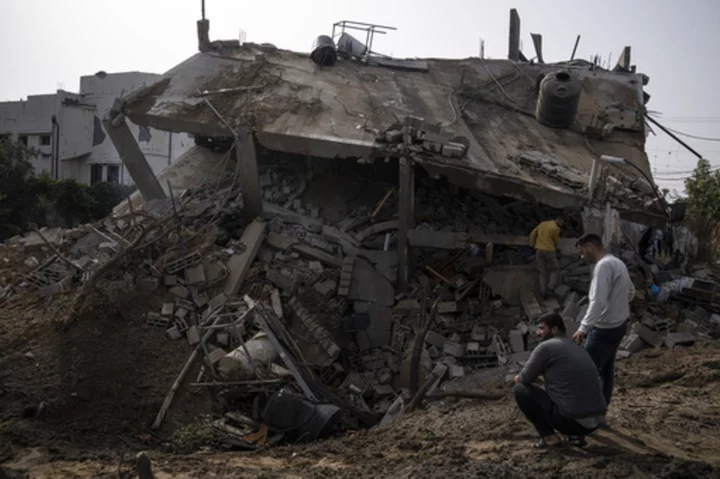GAZA CITY, Gaza Strip (AP) — The most violent confrontation in months between Israel and Palestinian militants continued for a third straight day on Friday, as Israeli warplanes struck targets in the Gaza Strip and militants fired rockets toward Jerusalem and southern Israel.
There were no immediate reports of casualties on either side Friday, as foreign mediators pressed ahead with efforts to reach a cease-fire. The past few days of fighting have killed 31 Palestinians in Gaza and a 70-year-old man in central Israel.
A burst of rocket fire from the Gaza Strip sent warning sirens wailing near the contested capital of Jerusalem, breaking a 12-hour lull that had raised hopes that Egypt, Qatar and the United Nations could soon be able to broker a cease-fire. Residents in Israeli settlements surrounding Jerusalem reported hearing explosions and seeing black smoke rising from the hills after an apparent missile interception.
The office of Prime Minister Benjamin Netanyahu said he was conducting a security assessment. The Israeli military said its warplanes struck Islamic Jihad rocket launchers. Gaza residents reported blasts in farms near the southern city of Rafah.
The cross-border exchanges this week have pitted Israel against Islamic Jihad, the second-largest militant group in Gaza after the territory's Hamas rulers. Since Tuesday, Israel says its strikes have killed five senior Islamic Jihad figures. Islamic Jihad has retaliated with over 800 rockets fire toward densely populated parts of Israel. In that time, Israel’s military said it has used airstrikes to hit at least 215 targets in Gaza, including rocket and mortar launch sites and militants preparing to use them.
Israeli bombs and shells have destroyed 47 housing units, and damaged 19 so badly they were uninhabitable, leaving 165 Palestinians homeless, Gaza’s housing ministry reported. In addition, nearly 300 homes sustained some damage.
Palestinians on Friday surveyed the wreckage wrought by the fighting.
“The dream that we built for our children, for our sons, has ended,” said Belal Bashir, a Palestinian living in Deir al-Balah in central Gaza, whose family home was reduced to a heap of rubble in an airstrike late Thursday. He and his family would have been killed in the thundering explosion if they hadn’t ran outside when they heard shouting, he said.
“We were shocked that our house was targeted,” he added as he pulled his young children’s dolls and blankets from a bomb crater.
At least 31 Palestinians in the Gaza Strip have been killed in the fighting, including seven children and four women, according to the U.N. humanitarian office. At least three of the children were killed by misfired Palestinian rockets, according to the Israeli military and the Palestinian Center for Rights. Over 90 Palestinians have been wounded, the Palestinian Health Ministry reported.
The civilians deaths have drawn condemnation from the Arab world and concern from the United States and Europe. In its past four wars against Hamas, Israel has repeatedly faced accusations of war crimes due to the high civilian death tolls and its use of heavy weapons against the crowded enclave. Israel, in turn, contends that Palestinian militant groups use civilians as human shields by fighting in their midst.
Hamas, the de facto civilian government with an army of some 30,000 in Gaza, has sought to maintain its truce with Israel while attempting to keep abysmal living conditions in the blockaded enclave from spiraling since a devastating 11-day war in 2021 that killed over 260 Palestinians. The group, which seized control of Gaza in 2007, has sat out this round of fighting — as it did a similar burst of violence last summer. In a sign of restraint, Israel has limited its airstrikes to Islamic Jihad targets.
Both sides had seemed on the brink of a cease-fire before the eruption of Thursday's violence. Friday's relative calm boosted hopes of progress.
Hamas officials told local media that Egypt was ramping up its diplomatic efforts to stop the fighting through “intensive contacts” with both Hamas and Islamic Jihad.
Islamic Jihad figures have sent mixed signals about the cease-fire talks. Senior official Ihsan Attaya complained early Friday that the mediators “have been unable to provide us with any guarantees.” A sticking point has been Islamic Jihad's demands that Israel cease its policy of targeted killings, Attaya said.
Islamic Jihad political bureau member Mohamad al-Hindi sounded more optimistic. From Cairo, where he traveled Thursday to hash out the details of a possible truce, he told media that he hoped both sides “would reach a cease-fire agreement and honor it today.”
This week's battles began when Israel launched, on Tuesday, simultaneous airstrikes that killed three Islamic Jihad commanders along with some of their wives and children as they slept in their homes. Israel said it was retaliating for a barrage of rocket fire launched last week by Islamic Jihad following the death of one of its West Bank members, Khader Adnan, from a hunger strike while in Israeli custody.
The airstrikes and rockets have shifted the focus of conflict back to Gaza after months of surging violence in the occupied West Bank under Israel's most right-wing government in history.
Israel has been carrying out near-nightly arrest raids in the West Bank that have killed 109 Palestinians so far this year — the highest such death toll in two decades. At least half of the dead are affiliated with militant groups, according to a tally by The Associated Press. At least 20 people have been killed in Palestinian attacks targeting Israelis during that time.
___
DeBre reported from Jerusalem

